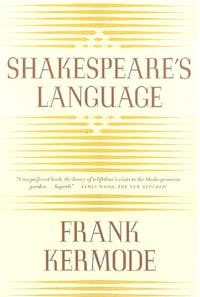Shakespeare's Language
 Download image
Download image
ISBN10: 0374527741
ISBN13: 9780374527747
Trade Paperback
256 Pages
$27.00
CA$30.00
The true biography of Shakespeare is in his plays. Frank Kermode, Britain's most distinguished scholar of sixteenth-century and seventeenth-century literature, has been thinking about Shakespeare's plays all his life. This book is a distillation of that lifetime of thinking. The finest tragedies written in English were all composed in the first decade of the seventeenth century, and it is generally accepted that the best ones were Shakespeare's. Their language is often difficult, and it must have been hard even for contemporaries to understand. How did this language develop? How did it happen that Shakespeare's audience could appreciate Hamlet at the beginning of the decade and Coriolanus near the end of it?
In this long-awaited work, Kermode argues that something extraordinary started to happen to Shakespeare's language at a date close to 1600, and Kermode sets out to explore the nature and consequences of the dynamic transformation that followed. For it is in the magnificent, suggestive power of Shakespeare's poetic language that audiences have always found meaning and value. The originality of Kermode's argument and the intelligence of his discussion make this a landmark in Shakespearian studies.
Reviews
Praise for Shakespeare's Language
"A magnificent book, the honey of a lifetime's visits to the Shakespearean garden . . . Kermode proves himself Coleridge's worthy heir."—James Woods, The New Republic
"A sane, canny, steadily informative book. Shakespeare's Language is rooted in an impatience with recent trends in Shakespeare criticism, which, in Kermode's view, has become so thematic or ideological as to 'have little time for his language.'"—Brad Leithauser, The New York Times Book Review
"At a time when many critics are busy slicing Shakespeare up to fit into their historical and political case studies, it falls to senior scholar Kermode to restore a sense of wholeness by reminding us of the Bard's unmatched achievement as a dramatic poet. Kermode's analysis authenticates the genius that outgrew not only the classical tropes of Shakespeare's early nondramatic poetry but even—in the later plays—the constraints of logic and grammar. In adumbrating the metamorphosis of Shakespeare's poetic style, Kermode carefully guides the nonspecialist through the plays, highlighting the impulses that transformed the lucid rhetoric of early works into the baffling yet rich obscurities of the post-Hamlet works. In such obscurities, we behold a remarkable new departure for dramatic verse, one capable of representing the dark intensity of minds in crisis. We also see a great artist's willingness to take risks, challenging his audience to follow him into an enlarged perspective on a perplexing world. In his perceptive response to the later poetry, Kermode demonstrates why the best readers continue to vindicate Shakespeare's risks by accepting his challenge."—Booklist
"The crowning action of [Kermode's] splendid career of criticism."—Richard Howard, The American Scholar
"[A] wonderful book, in which a master critic at the summit of his powers pays homage to a master playwright, whose electrifying eloquence holds us spellbound to this day."—Kiernan Ryan, The Independent on Sunday
"Shakespeare's Language contains too many riches to discuss in one review. But s20chiefly it manages to accomplish what no biography of the Bard has done, or perhaps ever can do: It conveys a sense of the man who wrote these plays . . . Kermode has captured the workings of a ceaselessly fertile imagination constantly searching for new ways to express the range of human emotion and experience. In doing so, he makes us fall in love with Shakespeare all over again."—Phoebe Pettingell, The New Leader
"Frank Kermode's book, modestly disguised as an introduction to the plays for non-specialists, [exhibits a] masterly directness . . . The most refreshing feature of Kermode's book, compared with the generality of current criticism, is its concentration on Shakespeare's words . . . A formidable achievement."—John Carey, The Sunday Times
"Kermode is at his very best when deeply involved in Shakespeare's presentation of characters locked in their processes of thought . . . at a time when what's been called Big Time Shakespeare is being energetically re-popularised for a new generation . . . when Bardolatry sentimentalizes him and some academic criticism turns him into a cultural construct, this concentrated, lucid, attentive book comes as a valuable reminder that, as the director Richard Eyre says here: 'The life of the plays is in the language.'"—Hermione Lee, The Observer


